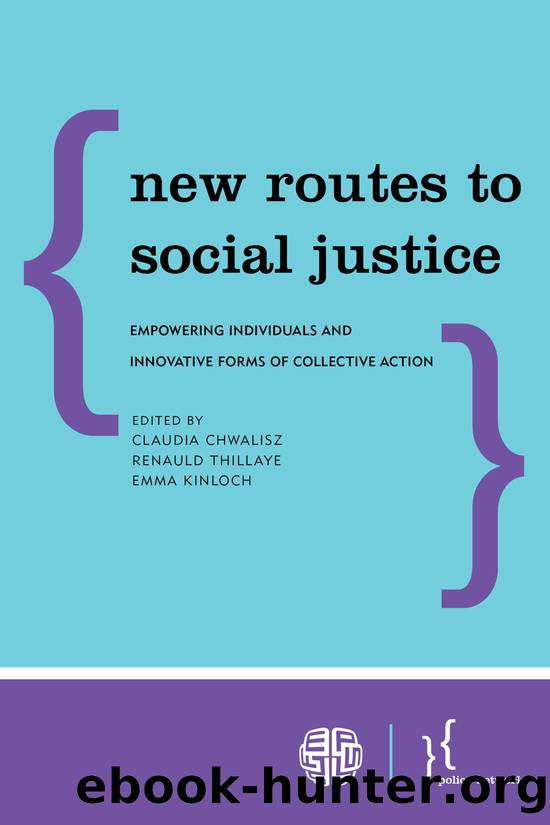New Routes to Social Justice: Empowering Individuals and Innovative Forms of Collective Action by unknow

Author:unknow
Language: eng
Format: epub
ISBN: 9781786605016
Google: -HjQtAEACAAJ
Goodreads: 34921874
Publisher: Policy Network
Published: 2017-01-15T11:37:10+00:00
BEHAVIOURAL INSIGHTS AND THE WELFARE STATE
Tiina Likki
INTRODUCTION
The UK welfare system is characterised by modest welfare benefits, strict entitlement rules and means-tested assistance. This means that most people need to engage with the system in order to gain and maintain access to benefits. In reality, beneficiaries often feel that they have no other option but to engage, which can mean that their contacts with the welfare system are not productive.
To improve engagement, the welfare system needs to understand and incorporate the factors that influence individual judgement, decision making and motivation. We can use new findings from the behavioural sciences to create this engagement, particularly in relation to income support and employment services. For example, in a trial run with Bedford Jobcentre Plus, increasing the personalisation of text messages meant that jobseekers were more likely to attend voluntary job fairs.1 Similarly, we know that people are influenced by those around them â both for the good and the bad.2 When people are told that most of those living around them pay their taxes on time, they are more likely to do so themselves.3 A welfare system that ignores the role of social norms and social influence is likely to perform less well than one that capitalises on social networks and peer support.
Behavioural insights draw on research from across fields as varied as psychology, economics and anthropology to provide a deeper understanding of the drivers of behaviour.4 Governments around the world increasingly use behavioural science to understand and encourage desirable behaviours such as pension savings, timely tax payments, and healthy eating. Behavioural science is also increasingly applied to different parts of the welfare state, from education and health to income maintenance, often resulting in low-cost and easily scalable interventions. In a study where parents of secondary school pupils were texted regularly about their childrenâs upcoming exams and homework, the childrenâs maths results were boosted by the equivalent of an extra month in the classroom.5
Similarly, in welfare policy, we need to understand the factors that influence behaviour and think innovatively about new solutions. For example, in a study done by the Behavioural Insights Team with Loughton Jobcentre Plus, simplifying the Jobcentre process for new claimants and encouraging jobseekers to make specific commitments to future activities increased the percentage of jobseekers no longer claiming benefits by 5 percentage points, and the effect persisted, albeit smaller, when tested across a further 12 Jobcentres.6
In addition to using a more realistic and evidence-based model of human behaviour, behavioural insights often draw on rigorous evaluation and innovative approaches to data analysis. For example, an analysis of data on over 120,000 cases relating to social worker decision making in three English local authorities showed, in addition to other findings, that cases were less likely to progress to further action if the referral was received on the weekend.7 These new analyses can suggest simple changes to improve the way that public services are designed and delivered.
Behavioural insights are also often linked to a commitment to rigorously test the impact of any policy change before deciding whether to implement it at scale.
Download
This site does not store any files on its server. We only index and link to content provided by other sites. Please contact the content providers to delete copyright contents if any and email us, we'll remove relevant links or contents immediately.
What's Done in Darkness by Kayla Perrin(25500)
Shot Through the Heart: DI Grace Fisher 2 by Isabelle Grey(18219)
Shot Through the Heart by Mercy Celeste(18160)
The Fifty Shades Trilogy & Grey by E L James(17774)
The 3rd Cycle of the Betrayed Series Collection: Extremely Controversial Historical Thrillers (Betrayed Series Boxed set) by McCray Carolyn(13189)
The Subtle Art of Not Giving a F*ck by Mark Manson(12912)
Scorched Earth by Nick Kyme(11832)
Stepbrother Stories 2 - 21 Taboo Story Collection (Brother Sister Stepbrother Stepsister Taboo Pseudo Incest Family Virgin Creampie Pregnant Forced Pregnancy Breeding) by Roxi Harding(11040)
Drei Generationen auf dem Jakobsweg by Stein Pia(10217)
Suna by Ziefle Pia(10186)
Scythe by Neal Shusterman(9259)
International Relations from the Global South; Worlds of Difference; First Edition by Arlene B. Tickner & Karen Smith(8608)
Successful Proposal Strategies for Small Businesses: Using Knowledge Management ot Win Govenment, Private Sector, and International Contracts 3rd Edition by Robert Frey(8419)
This is Going to Hurt by Adam Kay(7695)
Dirty Filthy Fix: A Fixed Trilogy Novella by Laurelin Paige(6453)
He Loves Me...KNOT by RC Boldt(5804)
How to Make Love to a Negro Without Getting Tired by Dany LaFerrière(5378)
Interdimensional Brothel by F4U(5304)
Thankful For Her by Alexa Riley(5161)
